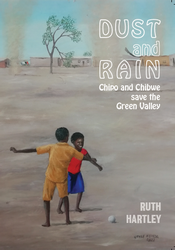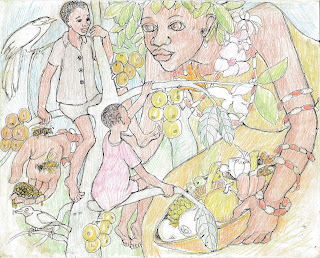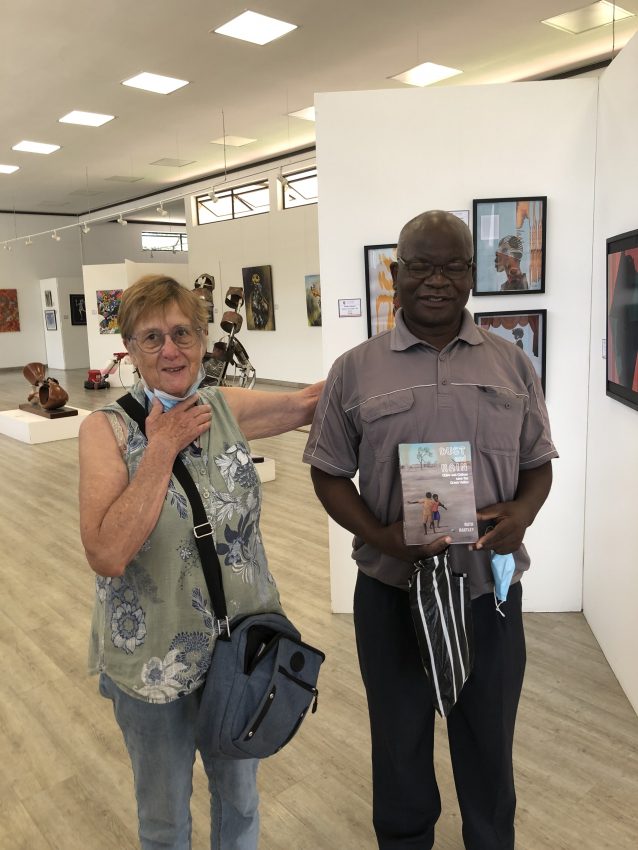
There was good news. Four children had survived a plane crash and 40 days wandering in the Amazon jungle.They were children who had knowledge and experience of nature but they were weak and hungry when they were found. This is a profound lesson for all humans. We are human animals. We are part of nature and our survival depends on understanding and working with nature. We can learn from these children. They are Lesly ,13, Soleiny, 9, Tien, 4, and Cristin, 1
Two children lost in the central African Evergreen forest – a climate change story

Our lives and well-being depends on how we deal with climate change. That is the reason I wrote my children’s book. It tells a story that is close to the story of the children in the Amazon so I’m publishing an excerpt for you here. It’s a great story. It’s an important book and you are needed to read it and to buy and share it please.
Dust and Rain, Chipo and Chibwe save the Green Valley
“We have to go in single file through the thick undergrowth and the trunks of crowded trees in the Evergreen Forest. We go slowly and carefully, looking and listening. Forests are strange for us and we don’t know what kinds of creatures live there or what dangers we may meet.
‘Where do you think we will find Makemba?’ I ask Chibwe. He hesitates, then answers.
‘I don’t really know but I think she must live at the heart of the Evergreen Forest.’
‘Is that the middle of the Forest or the most important place in it?’ I persist.
Chibwe stops. I wonder if I’ve annoyed him but I carry on speaking.
‘I mean we don’t know how big the forest is and it’s even easier to get lost and go in circles, isn’t it? The ground is all shadowed and sometimes we can’t even see the sun or sky.’
‘You are right,’ Chibwe says. ‘You often are. Makemba is the Wise Women of the Garden and we’ve been told that we’ll find her at the Source of the Great River. That must be the Heart we’re looking for – the Heart is where the Great River begins – and that is what we have to find.’
‘But where – – but how?’ I start to say, but Chibwe is looking up at the trees and thinking aloud.
‘I must find the tallest tree and climb up to where I can see for the greatest distance. If Imbolondo carried us across the High Savannah east alongside the Great River then I may be able to see where the Great River flows out of the Evergreen Forest in the west. If we can walk until we find the Great River then all we need to do is walk upstream until we find Makemba.’
‘Is that all!’ I say wishing I could climb up a tree and walk across the roof of the forest. I have a pain in my neck from staring up and I can see that the tallest trees don’t have many branches low down. ‘It won’t be easy.’
‘No, it won’t!’ says Chibwe, looking at me. I hope he’s not thinking of leaving me behind again. ‘Wait here with our food bag and water until I come down.’
Before I can say anything Chibwe is climbing up the nearest and tallest mundane tree and I’m sitting at the bottom worrying about the rustling sounds that I can hear around me in the forest.
I’ve got my back to the tree trunk but I know which branch I can grab first. If I have to climb up the tree in a hurry, I’ll drop everything and go. The small duiker that appears is as nervous as I feel. She has a yellow splodge on her spine like a permanent patch of sunlight and carries her head low. I’m keeping as still as possible watching her searching for food when the sky overhead explodes with screeches and falling fruit and she vanishes without a sound. Chibwe jumps down beside me doubled up with laughter.
‘I annoyed some monkeys,’ he says, grinning. ‘They were eating fruit when they saw me. Now they’ve thrown some at me. Let’s eat – I’m hungry!’
We gather up what we can. There isn’t much and some of it is squashed or rotten but still it’s food and the juicy green fruit taste as sweet as honey.
‘I’ve seen some rocky hills that stick up high above the forest and I’ve noticed some tall trees that we can use as landmarks on our route,’ Chibwe says after we’ve finished the fruit. ‘We’ll aim in that direction and I’ll climb trees every now and then to see if we’re still going the right way.’
‘We’re going to need to find something to eat, Chibwe,’ I say. ‘What do you think we can find here? We also need to find water. This forest is dry and I haven’t seen any streams.’
‘We’ll look out as we go,’ Chibwe says. ‘We’ve got two dried fish left and the water bottle is full.’
‘We’ll be running out of matches soon,’ I say. ‘We need to save them for an emergency.’

We set off walking through the trees. We try to go as straight as we can but the trees don’t move and we have to keep twisting round them. It’s slow going and I soon feel tired.
Our journey feels never-ending. The nights are long and dark and it’s difficult to find good places to sleep. Chibwe wants us to sleep in the trees if we can find branches that are broad and comfortable enough for one of us at least to get some sleep. We try different solutions.
‘You go up first, Chipo, and I’ll keep watch down here. Then we’ll change places,’ Chibwe says.
I know he’s trying to protect me. It works for a few nights but I have less and less energy for climbing. One night I fall out of the tree and wake Chibwe who’s asleep on the ground instead of staying on guard. I don’t break any bones or hurt myself much. Luckily I don’t land on Chibwe, though I do give him a terrible fright.
‘I thought you were a leopard,’ he says breathlessly.
We’re too tired to laugh and even too tired to be cross with each other.
‘We need to eat some meat,’ Chibwe says. ‘It will give us energy.’
‘How do we get meat?’ I ask. ‘If we set a trap then we have to keep coming back to it instead of looking for the river.’
‘Perhaps we’ll find more eggs on the way,’ Chibwe says, remembering that a few day ago we found a crested guineafowl nest and ate all its eggs raw.
‘They’re probably better for us if they’re turning into chicks,’ Chibwe adds. ‘More protein.’
We do find some. They don’t begin to fill my empty tummy but I feel a little less tired. We eat fruit if we can reach them easily. Climbing trees feels as if we add miles onto our journey. We collect some worms, a few grasshoppers, and a couple of cicadas. It’s not worth cooking them so we let them dry and then eat them one by one as we walk. I’m beginning to stumble more often.
We find ourselves under a Rain Tree. Its leaves are covered with holes made by tiny insects who live in bubbles of froth. The insects rain down pure sap sucked from the tree and leave puddles of clear water that we can drink from on the ground.
‘Should we stay here Chibwe?’ I ask. ‘At least we won’t be thirsty.’
‘We won’t find Makemba if we stay here,’ Chibwe answers. ‘One day the insects in the tree will fly away and no more rain will fall from the leaves.’
We’re too tired to worry about wild animals. When we bump into some wild pigs, Chibwe shouts at them and they run away. They’re all females and have no piglets with them, otherwise they might have chased us. They leave behind some roots they’ve dug up and we decide we can risk chewing them. We also find some chanterelle mushrooms nearby that taste delicious. Water is our biggest problem. We chew the few stems of grass we find for a bit of moisture and lick the dew off leaves. One night it rains but it’s hard to collect falling rain in a water bottle. Luckily, we were asleep on a bed of thick moss on the night it rained and we squeeze some water out of the moss and into our bottle.
‘It’s not enough,’ Chibwe says. ‘We must find a stream.’
Chibwe’s eyes look dull and his skin is greyish but that might be because my eyes don’t work so well.
‘Do you remember when we left home?’ I ask Chibwe. ‘When are we going back?’
‘Home?’ Chibwe says. ‘It’s so long ago. Why did we leave home?’
‘There’s something we’re supposed to be doing because of home -isn’t there?’ I say.
‘We’ve got to find water,’ Chibwe says. ‘We must keep going on.’
‘Chipo needs rest, Chibwe,’ I say. ‘Chipo needs sleep.’ If I don’t say my name, I won’t even remember who I am.
‘Okay,’ says Chibwe. His head is on his arms and his arms are wrapped around his knees and he is slipping over onto his side.
‘Okay,’ I say, and I crawl close to him and sleep too.
I think we will sleep for ever.”
For the rest of the story – buy the book!
Dust and Rain is published by Gadsden Publishers in Lusaka Zambia and is available on Amazon. When we buy from Amazon let’s remember the huge importance of the Amazon River.
3 Comments on “Four children alone in the Amazon Rain forest”
Yes!
So lovely to see an excerpt from your book here, Ruth! It reminds me of how much I enjoyed the adventure of Dust and Rain when I read it.
Of course, it’s sobering to think that the “adventure” of the four children who survived in the jungle after the plane crash was a life-and-death real event, not an imaginary story. But I think the comparison is suitable because, while the children and the events of your story may be fictional, its themes are the real life-and-death struggle with climate change that is now the true story of all humanity.
The child Greta Thunberg and all the climate activists before her, as well as those she has inspired, have been urging us for years to understand that, although the time frame is longer than one month, human life is genuinely at risk if we don’t respond. The evidence is now in the news all the time, and yet many people, including especially political leaders, still find it hard to own this story, acting as though it’s not our problem (or other problems are far more urgent) until the fire, flood or drought come right to our door.
Dust and Rain, with its themes of awareness, self-education, hope and determination, packaged in a wonder-filled story for children, is an important tool for engaging and motivating more people to do more.
Dear Tia,
Yes you are right – Dust and Rain is fiction and the real experience of the four children in the Amazon jungle is curiously unimaginable and I did hestitate to use it to draw attention to my book. I feel that these children have given us a valuable lesson in how to survive with nature if we learn from it and we do need to understand nature to survive climate change for all the world’s children.
Ruth